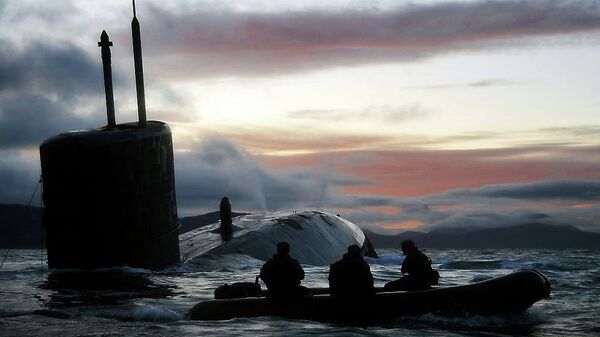The 5,300 ton, 130-man vessel suffered a dent to the top of its tower; defense officials stated that the ship appears to have struck a patch of floating ice. Defense officials denied that the sub may have struck a Russian submarine it was tracking.
An unnamed Royal Navy source is said to have told The Daily Mail that "striking ice is a problem of the environment we work in. Some patches of ice show up on our scanners but not all, with the density of the ice also being a factor. On this occasion some damage was sustained by the HMS Talent."
The newspaper explained that the impact had damaged the sub's outer layer of acoustic tiles, which are designed to minimize the transmission of sound waves under water.
Russian social media users were quick to comment on the affair:
Британской HMS Talent крышу снесло при столкновении с льдиной. Командир "Льдины" и её экипаж награждены... pic.twitter.com/e38hdRPxbj
— Volodin-Topwar (@VolodinTopwar) 5 апреля 2015
"The HMS Talent suffered damage to its tower in a collision with a patch of ice. The commander of the 'patch of ice' and her crew have been awarded."
Выслеживая российские суда, британская подводная лодка HMS Talent об льдину серьезно повредила рубку. pic.twitter.com/vgUgO0Yv0r
— ПРАВДИВАЯ ПРАВДА (@Pravdiva_pravda) 5 апреля 2015
"Chasing Russian ships, the HMS Talent seriously damaged its tower on an ice floe."
The Daily Mail notes that the old 'struck by ice' excuse had been used before, during the Cold War. The paper recalled a 1981 collision between the nuclear-powered HMS Sceptre and the Soviet nuclear ballistic missile sub K-211, and that the British vessel's crew had been instructed to say that they had hit an iceberg, not a Soviet vessel.
The six foot-wide dent in the top of the tower put the Royal Navy ship out of action for several months. The incident is said to have occurred last year, with the sub photographed arriving at the Submarine Refit Complex in Devonport last month. The Daily Mail explained that the incident was not reported earlier due to the "activity of Britain's fleet of nuclear submarines [being] strictly classified."
Britain has been engaged in a game of tag with Russian ships and aircraft patrolling the North Sea over the past year, reporting a dramatic increase in tracking activity. For their part, Russian officials have stated that Russian air and naval patrols in the North Sea are routine, and are carried out in compliance with international legal norms.
The HMS Talent is a hunter-killer nuclear submarine, launched in 1988, and fitted with Tomahawk cruise missiles and advanced tracking equipment.
Update: Asked to comment on the Daily Mail's story about the submarine by Russian media, a British Ministry of Defense spokesman noted that the accident did not lead to the vessel being put out of commission, adding that while the Ministry does not know "where journalists found their information, it hardly corresponds with reality."


